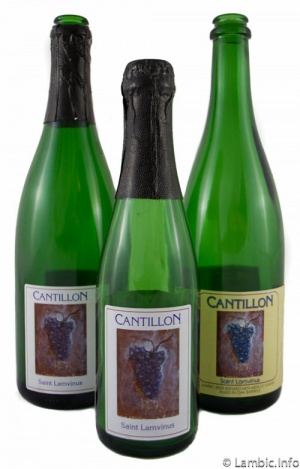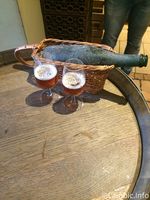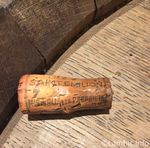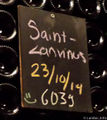Cantillon Saint Lamvinus

Description
Cantillon Saint Lamvinus is a grape lambic produced yearly. Originally, it contained Merlot and Cabernet-Franc grapes, but in the early 2000s the brewery switched to using only Merlot. The grapes used for Saint Lamvinus are not classified organic as the grower does not have the certificate but does grow organically according to Jean Van Roy.[1] It is bottled in 750 mL format usually sometime between mid-October and late-November. Though the brewery states that it is only available in 750 mL bottles, Saint Lamvinus was also available in 375 mL bottles on at least one occasion in 2005. The fruiting process for Saint Lamvinus consists of taking fresh grapes and placing them whole (without stems) into stainless steel tanks with two to 3-year-old lambic for a saturation period of 1-2 months. It is then transferred to a stainless steel bottling tank until it is ready to be bottled.
In January 2023, Cantillon announced that the 2022 vintage would, from that point on, use three grapes : merlot (55%) originating from Ms. Brissonot (a grapegrower who is not making wine, but instead sells everything to a local cooperative that takes care of it), as well as grenache noir (35%) and syrah (10%) from Domaine de Ventajou. The ratios may be slightly adapted on different vintages for balance (in 2024 it was 45% for each merlot and grenache noir, and 10% for Syrah), but in 2025, Jean Van Roy said that he was considering really increasing the syrah portion in future blends. That same year, a new switch was made and the grapes for Saint Lamvinus were sourced from different places : Chateau de Fontenille for Merlot in the Bordeaux area, as well as Lionel Maurel of Mas d'Agalis for Grenache Noir (who also provided the grapes for Carignan) and Clos Mathélisse for Syrah - both in the Langedoc region.[2]
History / Other Notes

The first known bottling of Saint Lamvinus occurred in 1994 at La tour du Roy with grapes form Château Belair in Saint Emilion. This particular bottling was a blend of Merlot and Cabernet Franc grapes. Lambic was sent to the wine producer in Saint-Émilion, France and placed in wine barrels with the grapes added. The barrels used for this batch were then burned after bottling. According to Jean-Pierre Van Roy, a second bottling occurred in 1995 which he was not present at. These bottles were rediscovered around 2017 in the back of the cellars at the château and a portion of them were to be served at the Quintessence event in 2020. Due to the coronavirus pandemic the event was rescheduled to 2021. A new label has been created for the vintage bottles.
Saint Lamvinus began being imported into the United States around 2001. That year's vintage consisted of Cabernet Sauvignon, Cabernet Franc, and Merlot grapes from Château Belair in the Bordeaux wine region. In 2002, Cantillon again sourced two types of Cabernet grapes along with Merlot grapes for the vintage.

The 2003 vintage used only Cabernet Sauvignon grapes and was fermented in 11 Port casks each with a 265 L capacity.[3] Since the 2003 vintage, there are no consistent notes on the grape varietals used in Saint Lamvinus.
In 2004, a special bottling of unblended Saint Lamvinus was released to Akkurat. The 2005 vintage of Saint Lamvinus was released in both 750 mL bottles and 375 mL bottles. The 375 mL bottles were available for a short time at Ølbutikken in Denmark.
Labeling for Saint Lamvinus has remained fairly consistent since its introduction into the regular production line in 1997 (stating 1995 vintage on the label). The United States import uses a larger yellow label (though white ones of the same design show up occasionally), while the rest of the world sees a thinner white label.
Bottle Log
Label Log
Photos
-
Jean Van Roy pouring a 1994 Saint Lamvinus
References
- ↑ Basic Brewing Radio Podcast, May 30, 2013
- ↑ Jean Van Roy, interviews with lambic.info, February & November 2025
- ↑ http://www.sheltonbrothers.com/beers/cantillon-st-lamvinus/ Shelton - Saint Lamvinus



















